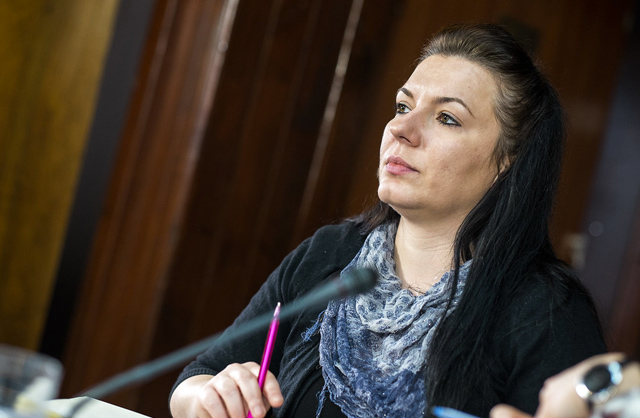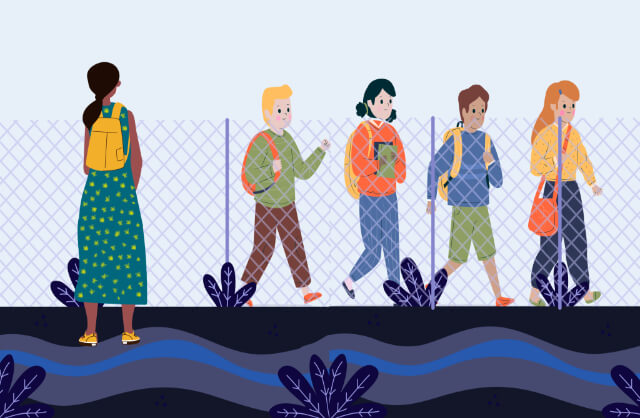The visible invisibility of disability: On the Inequality of the Families of People with Disability
December 2, 2016

“The state shouldn’t be the one to finish you off, but create conditions for you to live and prosper”.
Stefan, father of a child with a disability.
“We haven’t received the social assistance for two or three months. And when finally they finally decide to pay, decide to pay, they only pay for one month, not for three. It’s often happens. Sometimes I can’t even by the medicines for the child.”
The celebration of the 3rd of December – the International Day of Persons with Disabilities this year is in the sign of the 17 sustainable development goals and the 10th anniversary of the adoption of the Convention on the Rights of Persons with Disabilities (CRPD). In Macedonia, a part of the structure that the state should build in order to achieve these goals and act in accordance with its obligations to respect, protect and fulfill the rights laid out in CRPD are the measures and services for long-term care. One of the biggest shortcomings of the long-term care policy is the lack of care for the parents, relatives and friends of the persons with disabilities who need long-term care services and their complete invisibility in the legal and policy frameworks.
Namely, long-term care is a set of services aimed at providing conditions for the independent and autonomous execution of everyday activities by persons who are unable to perform those activities on their own in a dignified manner in the long run, which would provide them with the highest possible quality of life. Some people with disabilities are in need of such measures as “in-home, residential and other community support services, including personal assistance necessary to support living and inclusion in the community” (Article 19 (b), CRPD). Such services can be part of the formal care – provided by professional workers and workers paid for their work, or informal care – one provided by parents, relatives and friends of persons with disabilities. In Macedonia, out of 60,929 beneficiaries of social financial assistance, 34,086 persons use cash benefits for care from another person.
The needs of the informal caregivers
Studies show that part of the pillars of long-term care in Macedonia are the parents, relatives and friends of persons with disabilities, that is, informal caregivers. Namely, the first research on the intersectionality of social protection in Macedonia, conducted in 2014-2016 by the Institute for European Policy – Skopje (EPI), shows that with their unpaid work, informal caregivers in fact maintain the long-term care system. According to the study “The Art of Survival”, which emerged as a result of this research, providing care is a major element of the personal identity of the informal caregivers of persons with disabilities, but also a source of inequality, stigma and social exclusion. In the absence of services and care and assistance measures, all their needs, plans and desires are related to the person they care about. Consequently, they face:
Barriers to labor market participation: They cannot get involved as active jobseekers, nor can they commit themselves to “regular” working hours, due of the unpredictability of the needs of the people they care about and the need for flexibility, as well as the lack of services and care and assistance measures.
Poverty: The obstacles to participation in the labor market often result in their deteriorating financial situation and falling into or danger of poverty. The struggle for livelihood leads them to engage in informal economic activities where the investments in time are lower and the flexibility is higher. In such a situation, the financial assistance for care, though insufficient and overdue, is more than necessary for them.
• Gender inequality: Informal care affects women particularly hard. In conditions of lack of publicly available services, and still a dominant traditional division of roles in society, women most often carry the burden of care. Of the average 2.25 hours spent in unpaid, domestic activities, women spend more (3.38) hours per day versus men (1.11) engaging in these activities. If it is taken into consideration that the average hours spent in such activities in an urban environment (2.08) are lower than that in the rural environment (2.48), it can be concluded that women in rural areas are the ones who spend the most time doing such activities. Out of the unemployed who left their last job in order to care for children or adults with a disability, 94% are women. Reactor’s research on Women’s Participation in the Labor Market found that 42% of the respondents find that it is not lucrative for a woman to work if a family member is in need of care.
Deteriorating health: They neglect their health needs at the expense of the needs of their children/protégés/parents. They face significant levels of stress on daily basis and worry about the day-to-day activities, providing enough money to meet the basic needs and an ever-present fear of the future of their children protégés/parents after their own death.
Hindering, or putting an end to their social life: Due to the time necessary to do all the care-related activities, their social life outside the family comes last. So often, even though they have different needs in comparison to their children/protégés/parents, they often stop having “their own social life”.
• Inability or difficulty in adjusting the place of living: They make the necessary adjustments to thеir place of living. Sometimes these are smaller endeavors, for example, moving a person with reduced physical mobility to a lower floor. But sometimes they are much painstaking. For example, one parent adjusted all the electricity and water outlets in the house (installed automatic shutdown) after his child – a person with a psycho-social disability, caused a flood and a fuse breakout because of a forgotten tap on two occasions.
No accessibility, affordability, acceptability and quality of the state institutions and services: The time required to complete the administrative work, the limited physical and sensory accessibility and the geographical distance affect their inability to receive services from the state.
Penal and discriminatory state services: The administrative procedures do not take into account the unpredictability of their everyday life; the state has no understanding for missed deadlines due to unforeseen care obligations or because of inability to organize care during their absence from the home. Such an absence of adjustment is a systemically discriminating relationship.
Current regulations and practices
In Macedonia, the legal and policy frameworks do not recognize the informal caregivers. There are no policies for their assistance and support, nor is their labor recognized in any way. Given that it is mostly related to family relationships, the provision of care is seen as a “natural” obligation.
This is confirmed by the latest research on long-term care that EPI conducted in 2016 by interviewing persons working in the state institutions, the civil sector and international organizations.
There is unequal coverage of services and institutions, insurmountable, costly and illogical bureaucratic barriers and the introduction of temporary instead of long-term and systemic solutions. The potential at the local level is not used and no fieldwork of social work centers is stimulated; they are administratively overburdened and lack human and material resources.
Recommendations
In order to address these needs and problems, the following recommendations [1] are given to the Ministry of Labor and Social Policy:
To initiate and lead the preparation of a comprehensive analysis to determine the number, profile, needs and expectations of the informal caregivers, as well as the process of revision of the legal and policy frameworks.
Under the existing system, to undertake activities to:
o Increase the money allowance for other people’s care;
o Revise the necessary documents for exercising this right and return the burden of payment to the state;
o Revise the monthly income limit and the manner of calculating the income for exercising the right to a cash benefit for care (exclusion from the calculation of assistance for a particular social need, for example, for mobility).
Moving from the medical to the social model of understanding disability, in accordance with the commitments undertaken under the CRPD;
o Introducing help from formal caregivers during the morning hours and expanding the network of day care centers in the municipalities; and
o Introduction of “respite periods”, pension and health insurance, and the right to annual leave for informal carers and carers.
CV
Biljana Kotevska is a PhD candidate at the Queen’s University of Belfast University (QUB), where she works on research on the topic “Intersectionality of the post-Yugoslav space”. Her doctoral dissertation work is supported by the Special Scholarship of the School of Law (QUB) and the Civil Society Scholar Award (Open Society Institute, London). She holds a Master of Law with distinctions from the University of Essex, England and a Master of Democracy and Human Rights from the Universities of Sarajevo and Bologna. She is an external collaborator at the Institute for European Policy – Skopje (EPI), as the main researcher of the regional project “Who Cares for the Carers?” supported by the Regional Research Promotion Programme (RRPP). Biljana is a feminist and researcher, as well as a member of the European Network of Legal Experts in Gender Equality and Non-Discrimination Experts of the European Commission (EU) since 2011 as an expert on Macedonia in the area of non-discrimination.
[1] The full analysis also contains other recommendations as well as recommendations for other stakeholders (social work centers and help at home, social welfare offices, civil and international organizations), which due to limitations in size were not included in this text . These can be found at: www.epi.org.mk


